
Police Reform
The recent deaths of George Floyd and Breonna Taylor and other incidents of law enforcement officers using deadly force have stimulated protest and demands for policing reforms.
Two bills have been introduced in Congress that seek comprehensive police reform: The George Floyd Justice in Policing Act which has a House version (H.R. 7120) sponsored by Rep. Karen Bass (D-CA) and an identical Senate version (S. 3912), sponsored Sen. Cory Booker (D-NJ); and the JUSTICE Act (S. 3985), sponsored by Sen. Tim Scott (R-SC).
The provisions in these bills seek to impose new regulations regarding the use of force, increase accountability of law enforcement officers’ use of force, address implicit racial bias among officers, and regulate the acquisition of military equipment by police departments.
- National Sample: 3,226 Registered Voters
- Margin of Error: +/- 1.7% (three-quarter sample: +/- 2.0%)
- Fielded: July 2-9, 2020
- Full Report (PDF)
- Questionnaire with Frequencies (PDF)
The survey covered major provisions from the George Floyd Justice in Policing Act (H.R. 7120, S. 3912), and the JUSTICE Act (S. 3985) in the 116th Congress.
Proposals with bipartisan support discussed below include:
- Requiring that all officers be trained in de-escalation techniques and alternatives to the use of deadly force, requiring that such techniques be exhausted before an officer uses deadly force, and making officers criminally liable if they fail to do so
- Making it a duty for officers to intervene in cases where another officer is using excessive force
- Prohibiting chokeholds and other neck restraints
- Banning no-knock warrants, in which officers can enter a suspect’s house without warning
- Amending qualified immunity so that it is more possible to hold officers liable in civil cases for their use of excessive force
- Creating a national registry of police misconduct available to all police departments and the public
- Offering federal funds to states to enable them to always hire an independent prosecutor in cases against an officer who used deadly force
- Requiring all police officers to wear body cameras, and turn them on whenever they are on a call or interacting with a suspect
- Requiring all police officers to receive training to counter implicit racial bias
- Regulating and limiting police department’s access to military equipment
|
POLICIES REGARDING USE OF FORCE |
|
Respondents were presented a proposal in the George Floyd Justice in Policing Act (H.R. 7120, S. 3912) as follows: (An) important debate is whether, in the event that one officer is using excessive force, other officers should be expected to intervene to try to stop them. Many police departments already have such a requirement and provide training on when and how to intervene. Here is a proposal currently being considered in Congress:
They evaluated arguments for and against the proposal. The pro argument was found convincing by 85%, including eight in ten Republicans and nine in ten Democrats. The con argument was found convincing by just 46%. Two thirds of Republicans found it convincing, but a quarter of Democrats agreed.
Status of Legislation |
|
Respondents were presented a proposal in the George Floyd Justice in Policing Act (H.R. 7120, S. 3912) as follows: As you may know there is much controversy about officers using chokeholds and other restraints that block the flow of blood or oxygen to the brain. These methods were the causes of the deaths of Eric Garner and George Floyd. Here is a proposal currently being considered in Congress:
When they evaluated an argument in favor of the proposal, 82% found it convincing, including three-quarters of Republicans and nine in ten Democrats. The argument against was found convincing by just 47% and a quarter of Democrats. However, among Republicans nearly seven in ten found it convincing.
Related Standard Polls
Status of Legislation |
|
Respondents were introduced to a proposal from the George Floyd Justice in Policing Act (H.R. 7120, S. 3912), for requiring that officers be trained in the use of alternative tactics and de-escalation techniques, only use deadly force as a last resort, and be held criminally liable if they fail to do so. Respondents were told the proposal has three parts. The first part includes the new training that officers would be required to receive, and was presented as follows:
Officers would also have to be trained in what are called de-escalation techniques. The idea is to resolve the issue, restore order, get cooperation without having to resort to force. Some of these de-escalation techniques include:
The second part includes the requirement that deadly force be used only as a last resort, after alternative tactics and de-escalation techniques are exhausted:
These policies are already in place in many police departments. This legislation would require that it be official policy for all departments that receive Federal funding. The third part includes a change in standards for criminal liability when an officer uses deadly force: This legislation would also affect criminal cases when an officer uses deadly force and is charged with manslaughter or murder. Currently, on the federal level and in most states, the judge or jury need only determine whether the officer believed that their use of deadly force was reasonable in that situation to protect themselves or others, and if so, the officer would not be convicted.
These would be taken into account in assessing whether the officer is guilty. Respondents evaluated two pairs of arguments for and against the proposal. All arguments were found convincing by a majority of respondents, but the pro arguments did better in both cases. There were partisan differences. Majorities of Republicans found both pro and con arguments convincing--though the con arguments did better--indicating ambivalence about the issue. Majorities of Democrats only found the pro arguments convincing. The first pro argument used the example of Tamir Rice -- the 12 year old boy shot and killed by police who mistook his toy gun for a real one -- to underscore the consequences of not using alternative tactics before employing deadly force. This was found convincing by 73% overall, including a majority of Republicans (55%) and nine in ten Democrats. Related Standard Polls
A very large bipartisan majority favors criminal action against officers who use excessive force, even when given a middle option:
Status of Legislation |
|
A proposal to prohibit the use of no-knock warrants for use in drug investigations, which are currently used to break into a suspect’s house without warning, is in the George Floyd Justice in Policing Act (H.R. 7120, S. 3912). Before being presented the proposal, respondents were informed about the nature and rationale of no-knock warrants: Warrants are provided by judges and allow the police to enter and search a home. “No-knock warrants” allow police to not knock on the door but to break into a suspect’s home. Such warrants allow the police not to announce that they are law enforcement officers before they enter, and not to wear uniforms or insignia that identify them. A rationale for such no-knock warrants is that it allows officers to break into the home of someone suspected of dealing drugs. The idea is that the suspect will not have time to get guns that they can use against the officer or eliminate the evidence, for example, by flushing the drugs down a toilet. The controversy surrounding no-knock warrants was then explained, as well as the proposal for prohibiting them: Such no-knock warrants have become controversial because there have been a number of cases in which the police went to the wrong address and broke in. In the high-profile case of Breonna Taylor, she and her partner thought criminals were breaking-in, a violent exchange ensued, and Breonna Taylor was killed by an officer. Here is a proposal currently being considered in Congress:
Arguments for and against this proposal were then evaluated. The pro argument was found convincing by over three quarters, including 67% of Republicans and 87% of Democrats. Related Standard Polls
Status of Legislation |
|
INCREASING ACCOUNTABILITY OF LAW ENFORCEMENT OFFICERS |
|
Respondents were presented a proposal in the JUSTICE Act (S. 3985) as follows: A key idea for making law enforcement officers more accountable for their actions is to increase the use of body cameras. It also helps with training, supervision, and documentation. Currently, about half of all police departments do not have body cameras, and among those that do, not all of them require that they always be used. Here is a proposal currently being considered in Congress:
In evaluating the pro and con arguments the pro argument was found extraordinarily more convincing than the con argument. The pro argument was found convincing by nearly all respondents (93%), with no partisan differences.
Asked whether they, favor “each of the following policies intended to prevent police violence,” 88% favored, “Requiring on-duty police officers to wear video cameras that would record their interactions with the public as they occur,” including 88% of Republicans and 93% of Democrats. (June 2020, APNORC)
Status of Legislation A similar proposal is in the George Floyd Justice in Policing Act, sponsored by Rep. Karen Bass (D) (H.R. 7120) and Sen. Cory Booker (D) (S. 3912) in the 116th Congress, which would require all officers to wear body cameras, but would leave it to local and state departments to determine when they are required to be used. This bill passed the House with 233 Democrats and three Republicans voting in favor, and 180 Republicans and one independent voting against. It has yet to be taken up by the Senate. |
|
Respondents evaluated a proposal from the George Floyd Justice in Policing Act (H.R. 7120, S. 3912) to create a national registry of police misconduct available to all police departments and the public. Respondents were first informed of the controversy around the lack of access to police misconduct records: Currently, when a law enforcement officer has gotten multiple complaints for unlawful and/or abusive behavior or has been fired from a department for such behavior, they may go to another city or state and apply for a new position. The new city or state may not have access to information about this past behavior and their previous department is not required to and is often prevented from revealing such information to a new potential employer. They were then introduced to the proposal: Create a national database of police misconduct and require all law enforcement agencies to submit information about officer misconduct. This information would include:
This database would be available to all law enforcement agencies as well as other government agencies and the public. Respondents evaluated arguments for and against the proposal. The pro argument was found convincing by an overwhelming and bipartisan majority of 87%, including 83% of Republicans and 91% of Democrats.
Large majorities have favored making public all records of police misconduct:
A very large bipartisan majority favors not only creating a national database of police misconduct but also prohibiting police departments from hiring officers who have used excessive force:
Status of Legislation |
|
Respondents were introduced to a proposal in the George Floyd Justice in Policing Act (H.R. 7120, S. 3912) that incentivizes states to use independent prosecutors in cases involving police use of deadly force. Respondents were first informed of the concerns around the independence of prosecutors in cases against police officers: When there is a criminal case against a law enforcement officer for using deadly force, in most cases the prosecutor is someone, who regularly works closely with the officer’s department. Some people have a concern that these prosecutors have a conflict of interest. Such prosecutors rely on the cooperation and testimony of law enforcement officers of the agency when working to convict criminals. They were then introduced to the idea of having an independent prosecutor. To overcome a potential conflict of interest, a state can hire an independent prosecutor. An independent prosecutor is a person who does not regularly work with the law enforcement agency that employs the officer being investigated or charged. They were then introduced to the proposal: Here is a proposal currently being considered in Congress:
Arguments for and against the proposal were evaluated. The pro argument was found convincing by over three quarters, including 66% of Republicans and 89% of Democrats. Status of Legislation |
|
Respondents evaluated a proposal in the George Floyd Justice in Policing Act (H.R. 7120, S. 3912) to amend what is called “qualified immunity” for police officers charged in civil lawsuits. Respondents were first briefed on civil cases against police officers, how “qualified immunity” currently works and the related controversy: So far, we have been talking mostly about cases when a law enforcement officer’s use of force results in them being charged with a crime within the criminal justice system. We will now look at cases where an officer is charged in a civil case. As you may know, civilians can sue law enforcement officers (as well as other government officials) if they violate their legal rights. An officer can violate a person’s rights by using excessive force, such as hitting or shooting them when that was not necessary. Also, if an officer unnecessarily kills a civilian, their family can sue the officer. If that person wins the civil court case, then they will receive money as compensation. However, in fact, it is very rare that an officer is held liable. This is because there are laws and court rulings that provide officers what is called “qualified immunity.” This immunity is very controversial because there have been some cases in which an officer wounded or killed an unarmed civilian in a way that was widely perceived as unlawful, unjust, or unnecessary, but was not held liable as a result of this immunity. They were then introduced to the proposal for amending qualified immunity. We are now going to ask you to evaluate a proposal to make it more possible that officers would be held liable for using excessive force by modifying the rules for qualified immunity. Currently, when an officer is sued for excessive use of force, they can be granted immunity if they say they were acting in good faith--not out of anger or racial hostility--and believed their actions were lawful, irrespective of how most others may view it. In many cases, a judge or jury has accepted this as a basis for dismissing the case. The first part of a proposal currently being considered in Congress would no longer allow officers to be granted immunity solely on the basis that the officer says they were acting in good faith and believed their actions were lawful. This would mean that the judge or jury must determine whether the officer’s conduct was in fact lawful, irrespective of what the officer believed. In addition, when an officer is sued for excessive use of force, they can be granted immunity if there have not been previous cases in which officers were held liable for the same conduct in very similar circumstances. In many cases a judge or jury has accepted this as a basis for dismissing the case. The second part of the proposal would no longer allow officers to be granted immunity solely on the basis that there have not been previous cases in which other officers were held liable for the same conduct in very similar circumstances. This would make it more likely that the case will move forward, and that a judge or jury assesses whether the officer's use of force was unlawful -- whether or not there has been a similar case with similar circumstances. The argument in favor of the proposal was found convincing by a large bipartisan majority of 73%, including 57%of Republicans and 87% of Democrats. Related Standard Polls
A Pew poll from June 2020 seemed to be referencing qualified immunity when they asked respondents to choose between these two statements.
However this is an inaccurate depiction of the issue. Civilians already have the ability to sue police officers. Amending qualified immunity would only make it more possible to be successful in such a suit. Status of Legislation |
|
RESPONSES TO SUBSTANCE ABUSE & MENTAL HEALTH ISSUES |
|
Some cities have set up programs that enable and encourage police officers, when they interact with a person who has committed a minor non-violent crime as a result of their substance use disorder, to get them into a treatment program rather than charge them with a crime. This is called a “diversion” program. Respondents were introduced to this idea, as follows: As you may know, when a law enforcement officer encounters someone committing a minor non-violent offense, such as possessing a small amount of drugs, loitering, or disturbing the peace, they have various options. They can choose to arrest them, give them a warning, or let them go. There is an additional option being used in some cities: if law enforcement officers perceive that a non-violent offender has a substance use disorder, rather than charging them with a crime, require them to enter a treatment program and give them information about available programs. If the person refuses, they may be charged. They were then presented the following proposal: In Congress, there is a proposal to provide funds to allow cities and states to set up or expand such programs. These programs would:
The argument in favor was found convincing by a large majority, overall and among Republicans and Democrats. The argument against was found convincing by just under half, but a large majority of Republicans and half of independents. Asked for their final recommendation, 74% favored the proposal, including 58% of Republicans, 90% of Democrats and 71% of independents. |
|
Respondents were presented background information on interactions between police officers and those with mental health issues, as follows: people will often call 911 because they are concerned that a person:
In nearly all cities, the 911 operator sends law enforcement to the scene. Many police officers, however, are not trained to deal with people with mental health issues. Thus, when officers encounter such people, they sometimes do not understand what is occurring and may act in ways that provoke a reaction in the person. Police officers may then try to arrest the person which has led to escalation resulting in injury or even death. They were then introduced to programs that have been set up which send mental health professionals to such scenes first, rather than police officers: A few cities (including in Texas, Oregon and other states) have established programs that deal with people having mental health issues by using professionals trained to deal with them rather than police officers. More specifically the programs :
The goal of these programs is to use as little force as possible and to get the person having a mental health issue back home or into a hospital, and into a mental health treatment program if they are not already in one, rather than have them arrested and put in jail. In some cases, these professionals can bring a law enforcement officer if they feel it is needed or call one if the situation does escalate. Evaluation of these programs have found that they have resulted in reductions in the use of force, injuries, arrests, and incarcerations. They have also resulted in reductions of costs related to imprisonment and lawsuits over the use of excessive force. Respondents were then told that there is a proposal to, “provide funds to cities and states that want to set up such programs or want to expand existing programs.” The argument in favor was found convincing by a very large and bipartisan majority. The argument against was found convincing by a smaller but still substantial majority, but less than half of Democrats. |
|
OTHER PROVISIONS |
|
Requiring that all police officers receive training to address implicit bias toward minorities is in the George Floyd Justice in Policing Act (H.R. 7120, S. 3912). Respondents were first presented information about racial disparities in police use of force: As you may know, studies have found that, even in similar situations, officers use excessive force against minorities more than they do against white civilians. Black people are more than two times as likely to be shot and killed by officers than white people and are more likely to be unarmed when it happens. The nature of implicit bias, and its consequences, was explained: Based on numerous studies, there is evidence that the problem here is not primarily that most officers have conscious negative attitudes toward minorities. Rather there is evidence that many officers -- like most people -- have what is called an “implicit bias.” This is an unconscious negative attitude toward certain types of people that leads one to interpret their behavior in a more threatening way. This could, for example, lead an officer to be more likely to assume that someone from a particular race poses a danger and is getting ready to act violently against the officer, leading the officer to use deadly force preemptively. Because the criminal justice system is supposed to treat every person equally, there is concern that implicit bias is resulting in minorities, especially Black Americans, being treated unfairly. The proposal was then presented, as follows: Training methods have been developed to help people understand better how implicit bias may be affecting them and to consciously work to counter its effects. Various law enforcement agencies have used these training methods with their officers. While some studies have found the training to be effective in reducing implicit bias, others have found it to be ineffective. Here is a current proposal being considered in Congress:
Arguments for and against the proposal were evaluated. The pro argument did substantially better, with the con argument found convincing by a majority only of Republicans. The pro argument was found convincing by nearly three quarters, including 58% of Republicans and 89% of Democrats. Status of Legislation |
|
Respondents were introduced to a proposal in the George Floyd Justice in Policing Act (H.R. 7120, S. 3912) for regulating police departments access to military equipment. Respondents were first informed about the controversy: As you may know, there is a controversy about local law enforcement agencies receiving surplus equipment from the US military. Currently local law enforcement agencies can get such surplus equipment for only the cost of shipping them. There are two concerns that have been expressed about this program:
They were then presented the proposal that would require that:
Arguments for and against the proposal were found convincing by a majority, although the pro did better overall. The pro argument was found convincing by seven in ten, including a modest majority of Republicans (55%) and 84% of Democrats. Status of Legislation |





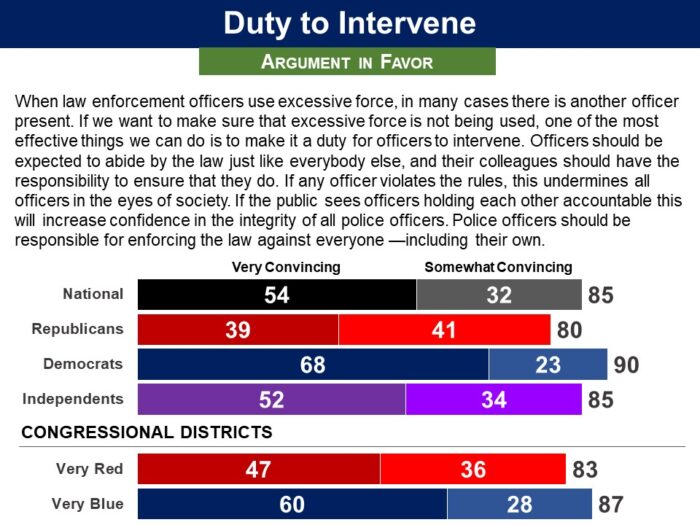
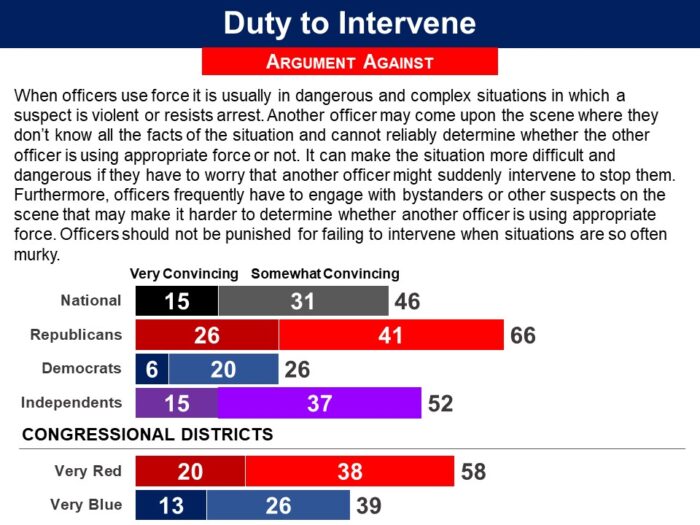 Asked for their final recommendation, an overwhelming majority of 82% favored it, including 71% of Republicans and nearly all Democrats (94%).
Asked for their final recommendation, an overwhelming majority of 82% favored it, including 71% of Republicans and nearly all Democrats (94%).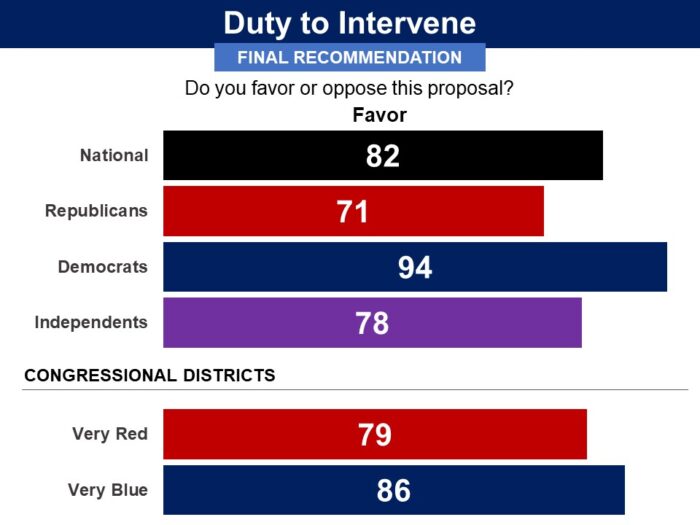
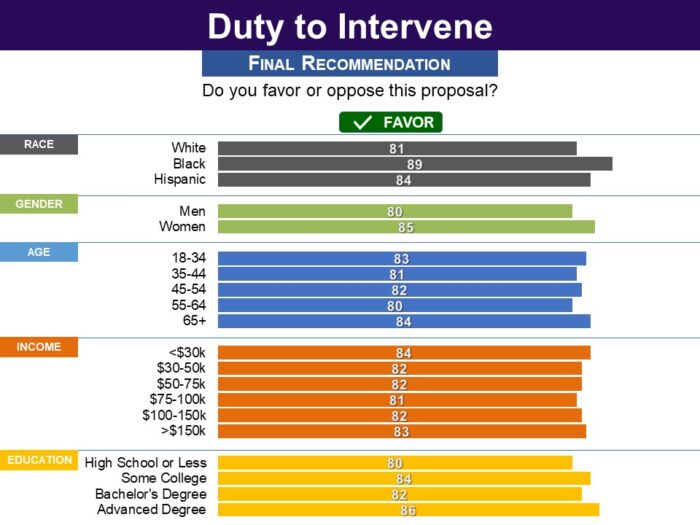 Related Standard Polls
Related Standard Polls


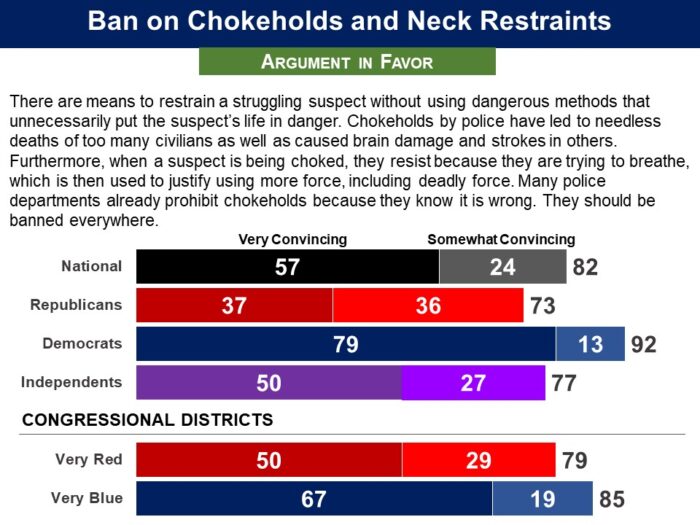
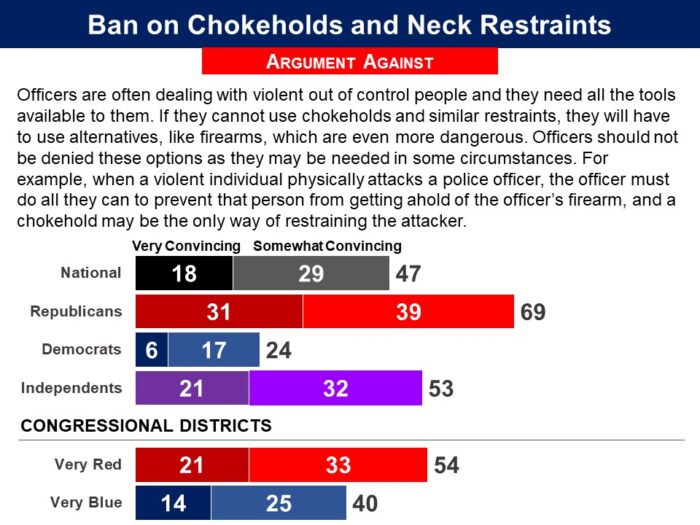 Asked for their final recommendation, an overwhelming majority of 73% favored it, including 55% of Republicans, 68% of Independents, and nearly all Democrats (91%).
Asked for their final recommendation, an overwhelming majority of 73% favored it, including 55% of Republicans, 68% of Independents, and nearly all Democrats (91%).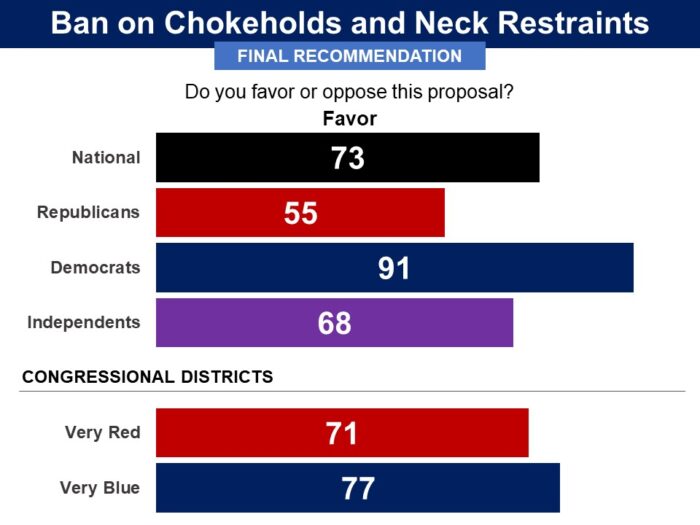
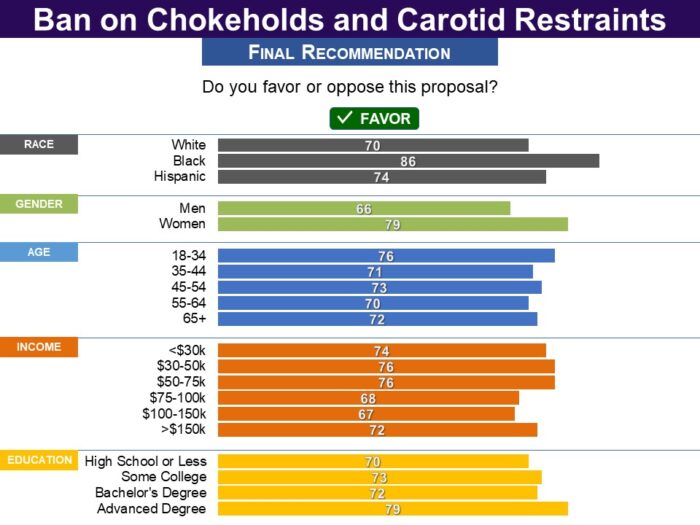



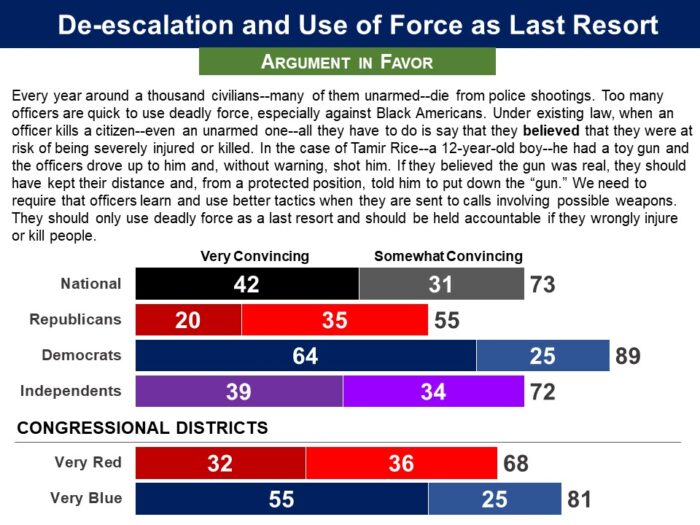 The first con argument emphasized how police put their lives on the line daily, often making split-second decisions, and that imposing new limits on them will put their lives at risk and embolden criminals. Six in ten found this convincing, including 86% of Republicans. Just 37% of Democrats agreed.
The first con argument emphasized how police put their lives on the line daily, often making split-second decisions, and that imposing new limits on them will put their lives at risk and embolden criminals. Six in ten found this convincing, including 86% of Republicans. Just 37% of Democrats agreed.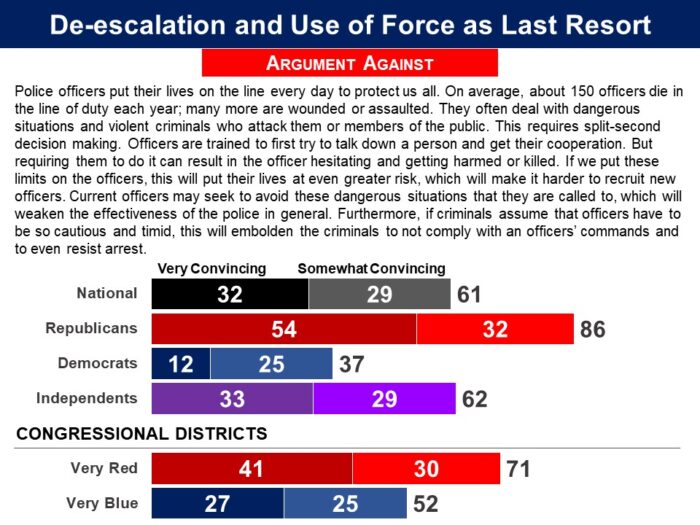 The second pro argument cited the effectiveness of this policy when it has been implemented in some states. A large bipartisan majority of eight in ten found this convincing, including seven in ten Republicans and nine in ten Democrats.
The second pro argument cited the effectiveness of this policy when it has been implemented in some states. A large bipartisan majority of eight in ten found this convincing, including seven in ten Republicans and nine in ten Democrats.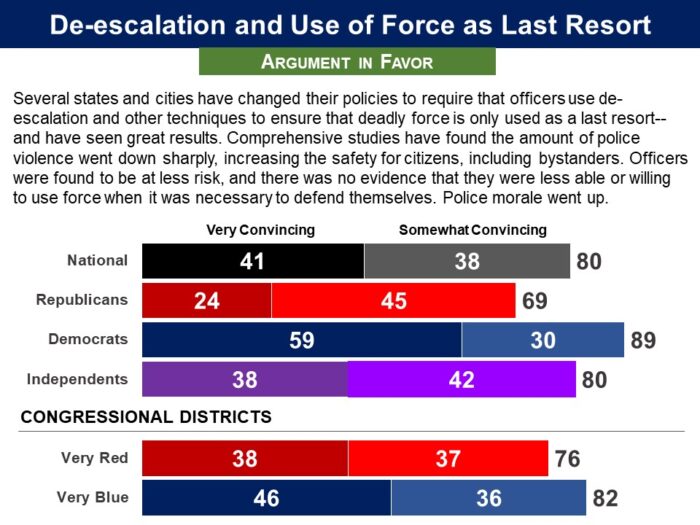 The second con argument struck against the new criminal liability standards, claiming they would entangle courts, and discourage officers from taking necessary actions to protect themselves and others. A modest majority of 55% found this convincing. There was, again, a fifty point gap between Republicans (82%) and Democrats (30%).
The second con argument struck against the new criminal liability standards, claiming they would entangle courts, and discourage officers from taking necessary actions to protect themselves and others. A modest majority of 55% found this convincing. There was, again, a fifty point gap between Republicans (82%) and Democrats (30%).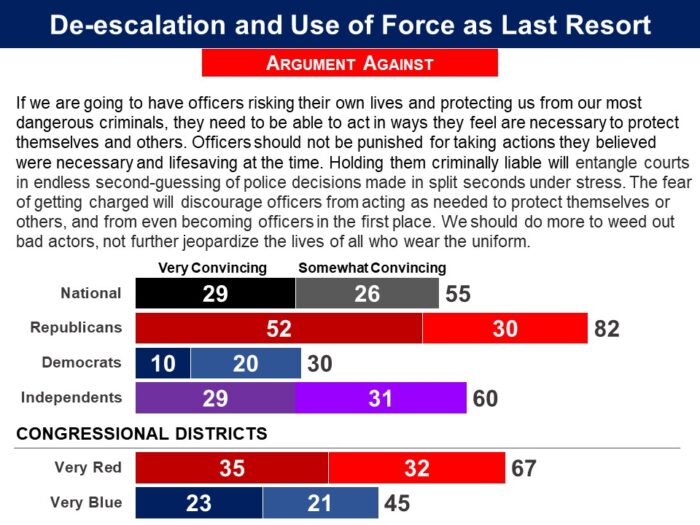 Asked for their final recommendation, 69% favored the proposal, including 90% of Democrats And 67% of independents. Less than half of Republicans (46%) favored the proposal, with 53% opposed.
Asked for their final recommendation, 69% favored the proposal, including 90% of Democrats And 67% of independents. Less than half of Republicans (46%) favored the proposal, with 53% opposed.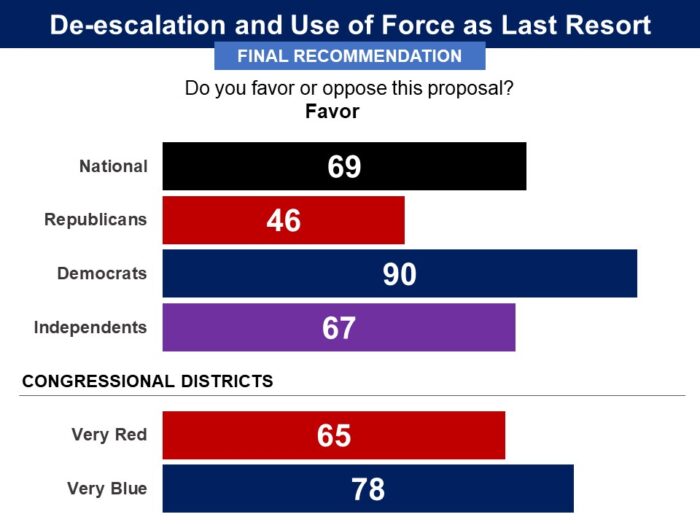
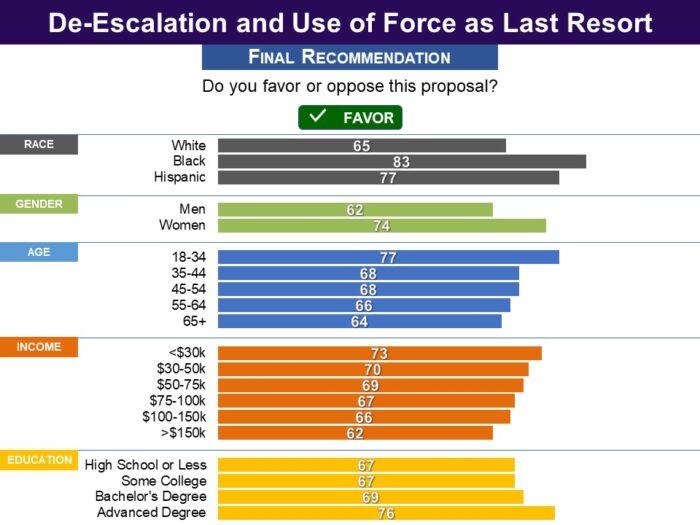 Respondents also rated the acceptability of the proposal on a 0-10 scale. It was found at least tolerable (5-10) by eight in ten, including nearly all Democrats (94%). Though less than half of Republicans favored the proposal, 64% found it at least tolerable – consistent with their ambivalent response to the pro and con arguments.
Respondents also rated the acceptability of the proposal on a 0-10 scale. It was found at least tolerable (5-10) by eight in ten, including nearly all Democrats (94%). Though less than half of Republicans favored the proposal, 64% found it at least tolerable – consistent with their ambivalent response to the pro and con arguments.

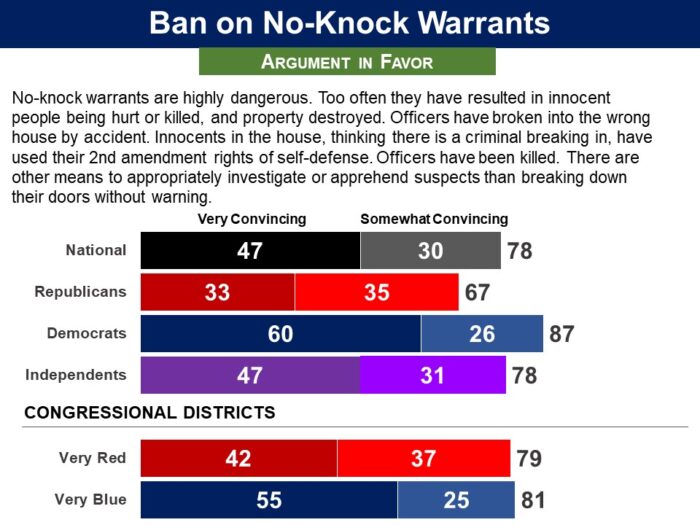 The con argument was found convincing by a bare majority of 51%, including seven in ten Republicans (69%), but less than four in ten Democrats (36%) convinced.
The con argument was found convincing by a bare majority of 51%, including seven in ten Republicans (69%), but less than four in ten Democrats (36%) convinced.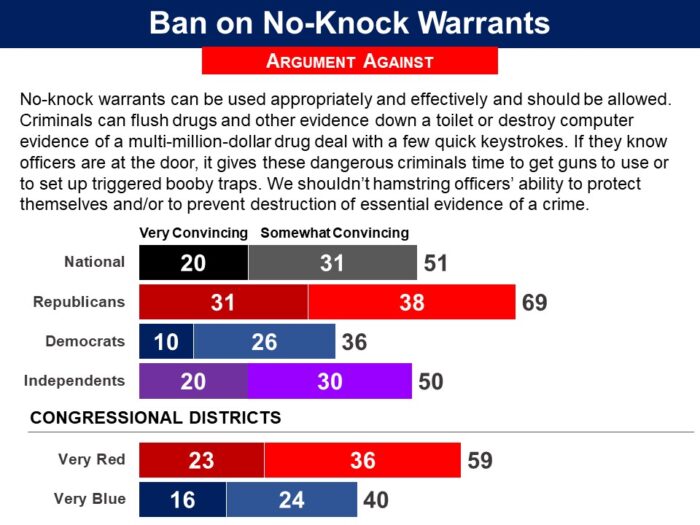 Asked for their final recommendation, a majority of 65% favored it, including 82% of Democrats and 65% of Independents. Less than half of Republicans–45%–favored it (53% opposed).
Asked for their final recommendation, a majority of 65% favored it, including 82% of Democrats and 65% of Independents. Less than half of Republicans–45%–favored it (53% opposed).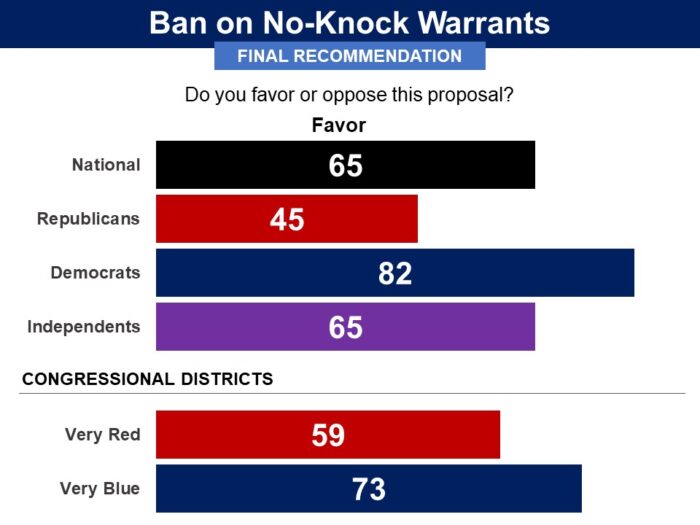
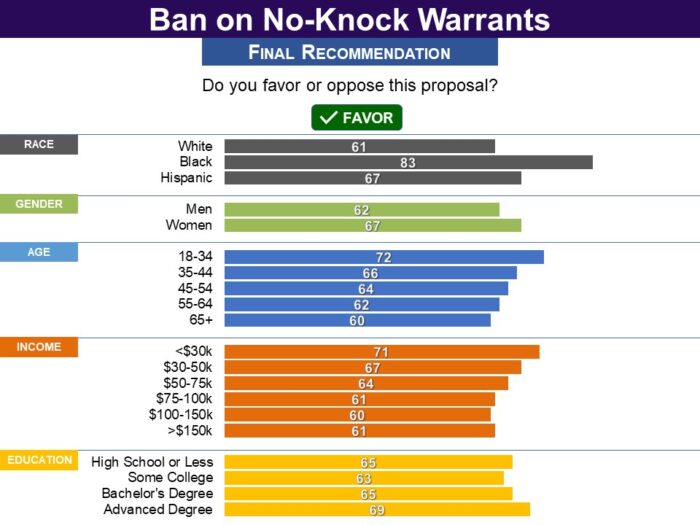 However, asked to rate the proposal on a 0-10 scale, 74% found the proposal at least tolerable (5-10), as did 58% of Republicans and 88% of Democrats.
However, asked to rate the proposal on a 0-10 scale, 74% found the proposal at least tolerable (5-10), as did 58% of Republicans and 88% of Democrats.


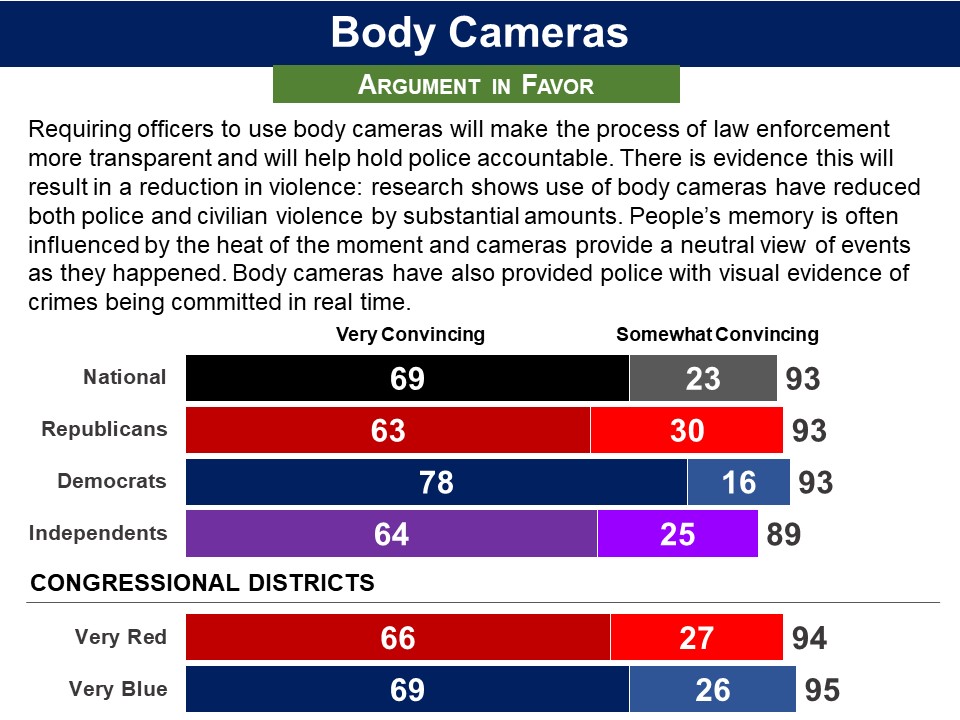 The con argument was found convincing by just a quarter, including just 36% of Republicans and only 18% of Democrats.
The con argument was found convincing by just a quarter, including just 36% of Republicans and only 18% of Democrats.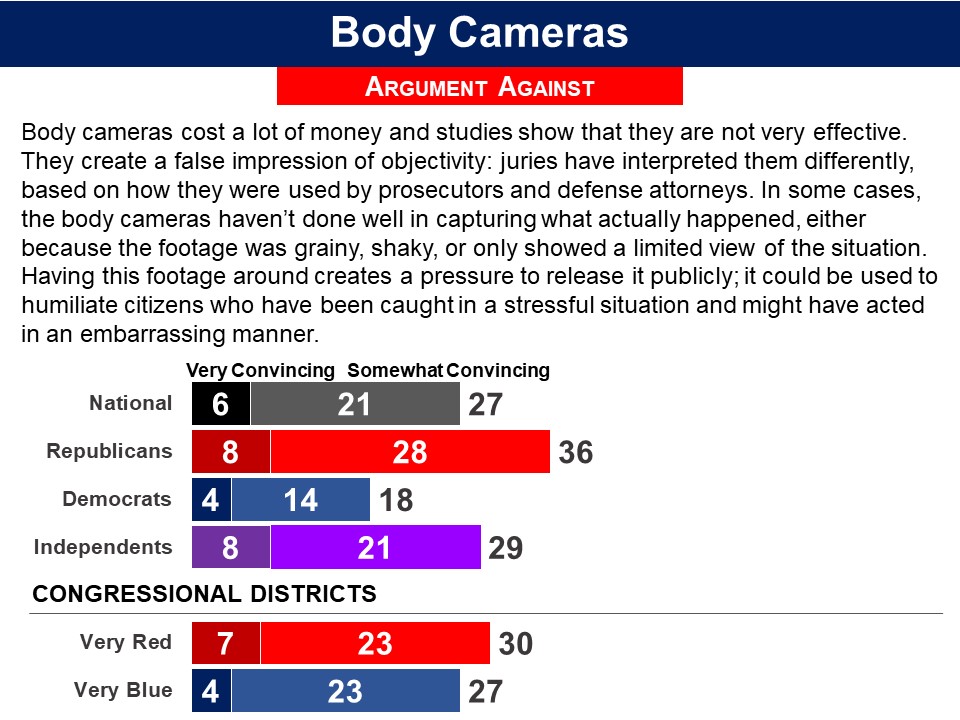 This proposal was the most popular and the most bipartisan of all tested in this study, with 89% in favor, including 85% of Republicans, 86% of Independents and 94% of Democrats.
This proposal was the most popular and the most bipartisan of all tested in this study, with 89% in favor, including 85% of Republicans, 86% of Independents and 94% of Democrats.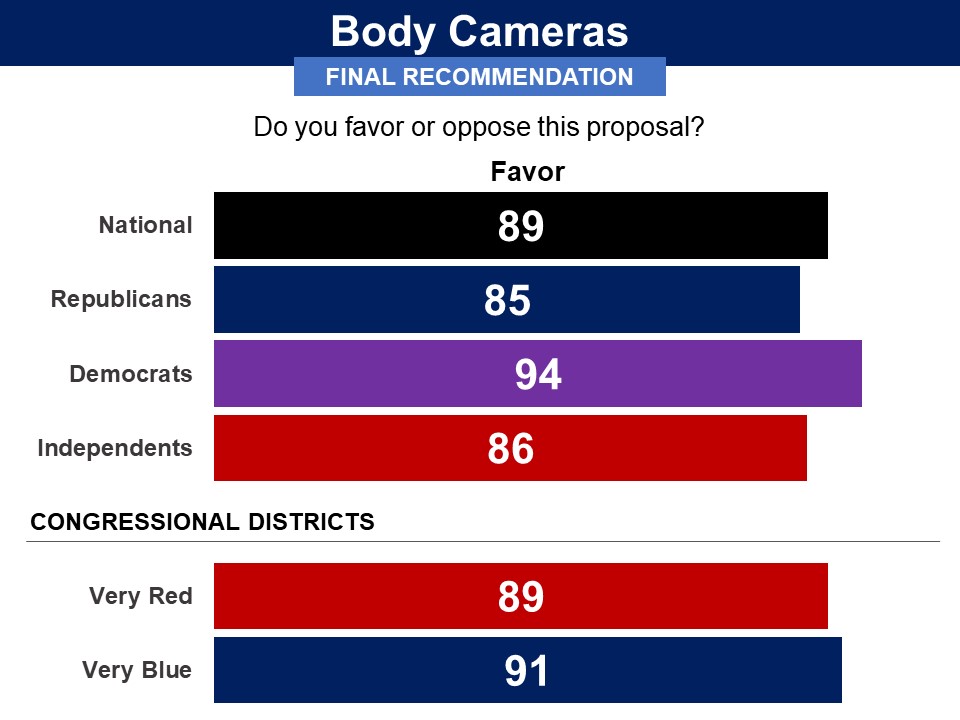
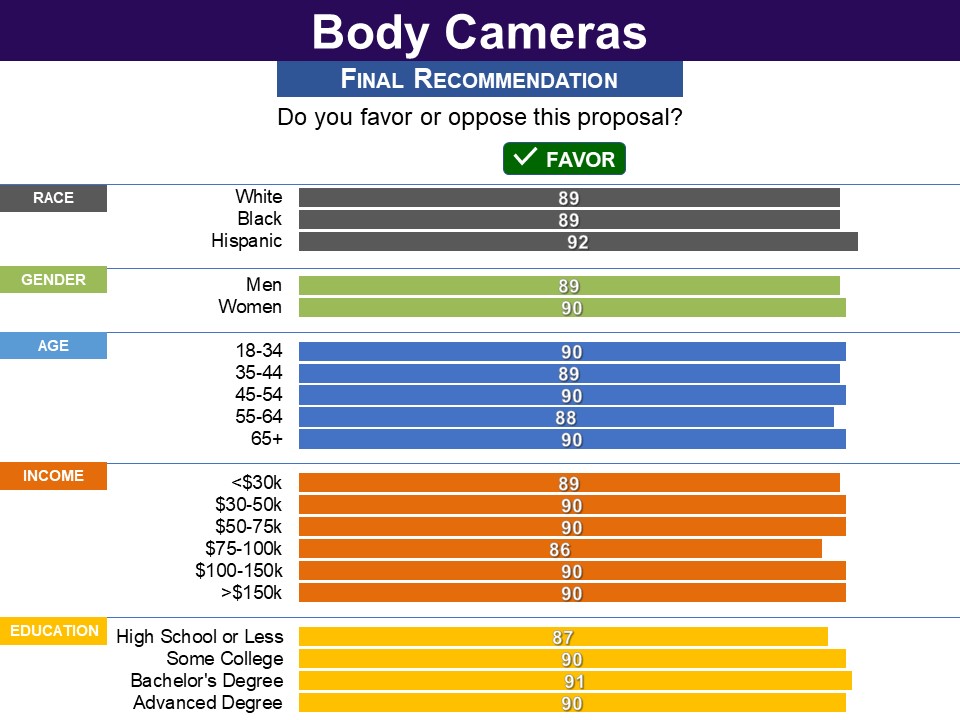 Related Standard Polls
Related Standard Polls


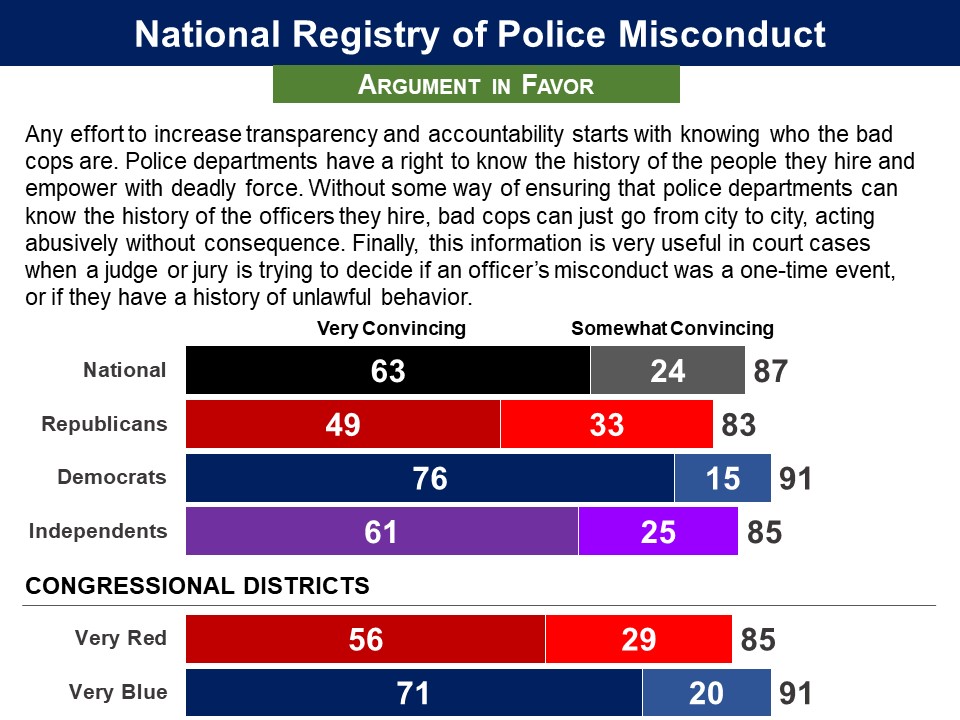 The con argument was found convincing by just 43%, including a majority of Republicans (61%), but just a quarter of Democrats.
The con argument was found convincing by just 43%, including a majority of Republicans (61%), but just a quarter of Democrats.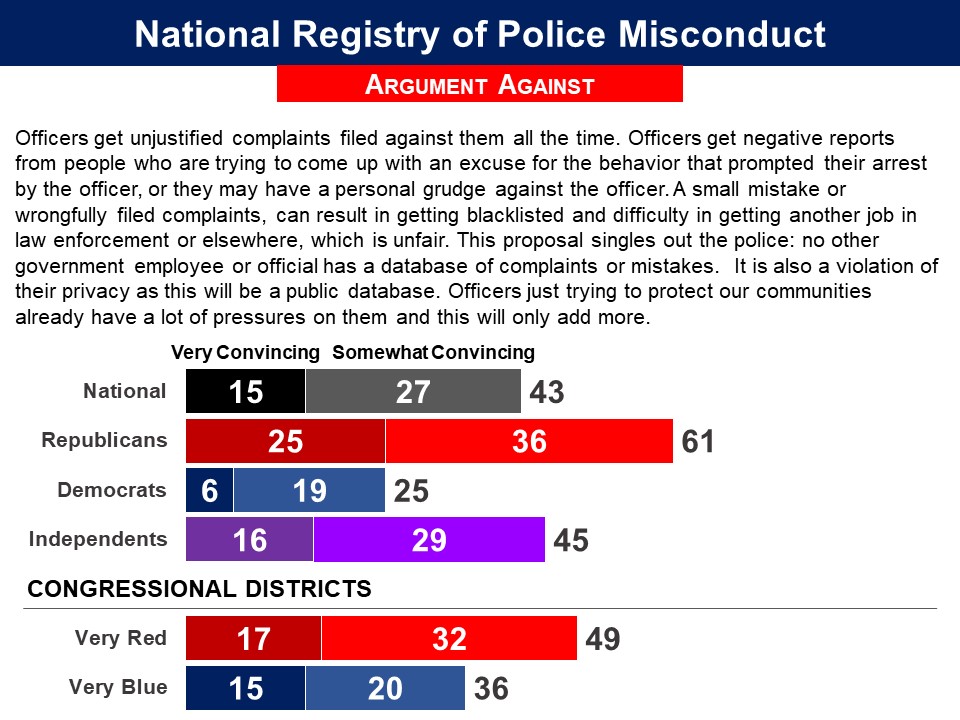 Asked for their final recommendation, a very large bipartisan majority of 81% favored it, including 70% of Republicans, 77% of Independents and 92% of Democrats.
Asked for their final recommendation, a very large bipartisan majority of 81% favored it, including 70% of Republicans, 77% of Independents and 92% of Democrats.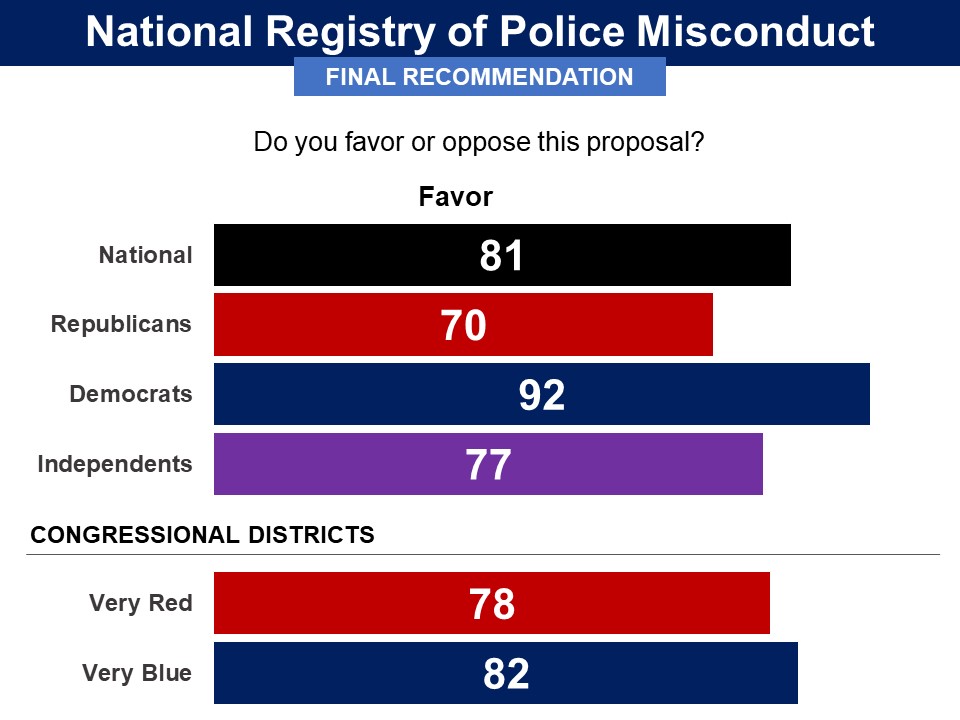
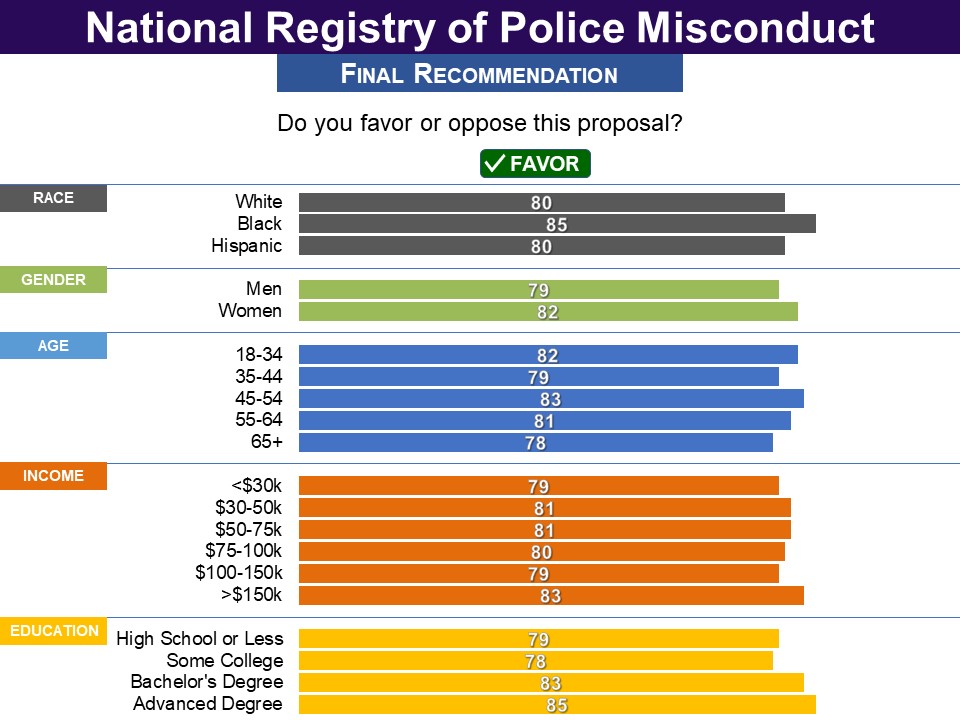 Related Standard Polls
Related Standard Polls

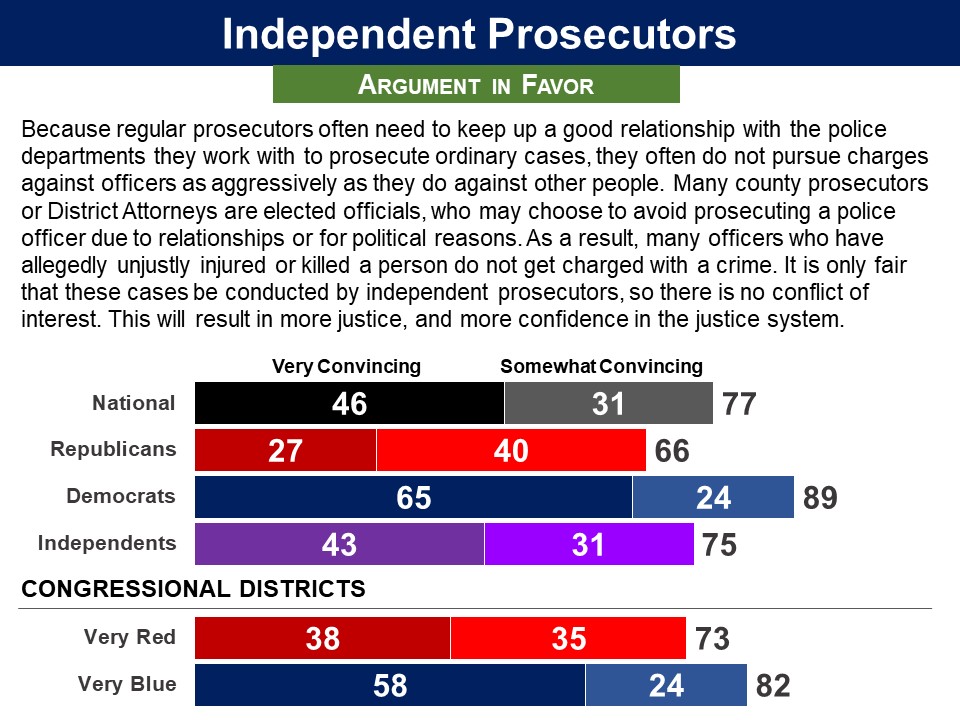 The con argument was found convincing by less than half (44%), including just a quarter of Democrats, but two thirds of Republicans.Asked for their final recommendation, a bipartisan majority of seven in ten favored the proposal,including 86% of Democrats, 68% of independents, and a bare majority of Republicans (52%).
The con argument was found convincing by less than half (44%), including just a quarter of Democrats, but two thirds of Republicans.Asked for their final recommendation, a bipartisan majority of seven in ten favored the proposal,including 86% of Democrats, 68% of independents, and a bare majority of Republicans (52%).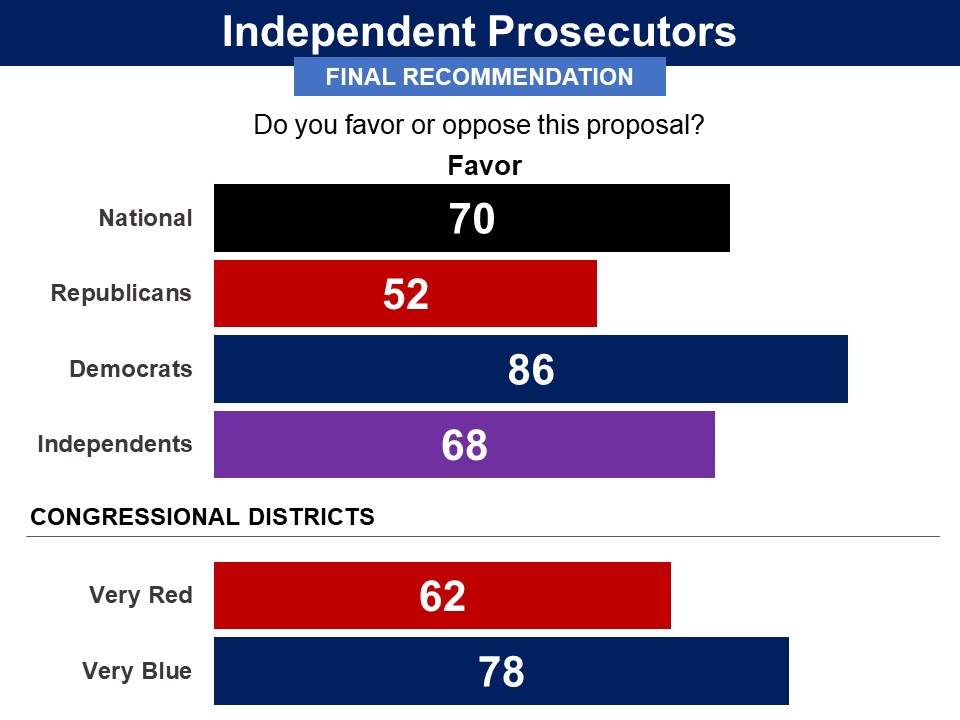
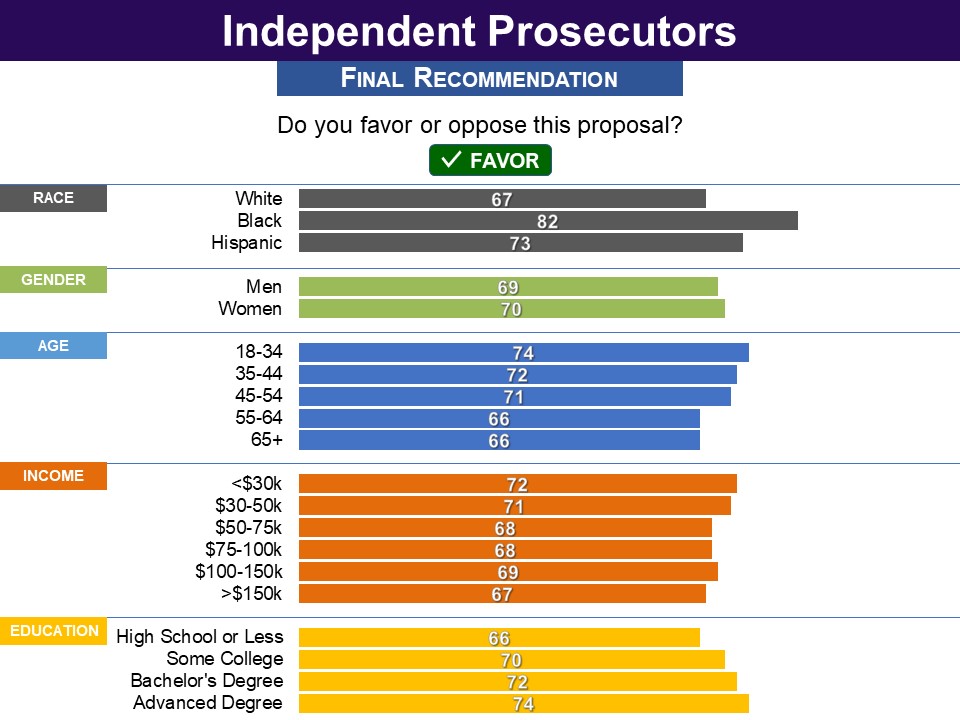 On the 0-10 scale, a more robust 66% of Republicans found the proposal at least tolerable (5-10) as did 92% of Democrats.
On the 0-10 scale, a more robust 66% of Republicans found the proposal at least tolerable (5-10) as did 92% of Democrats.


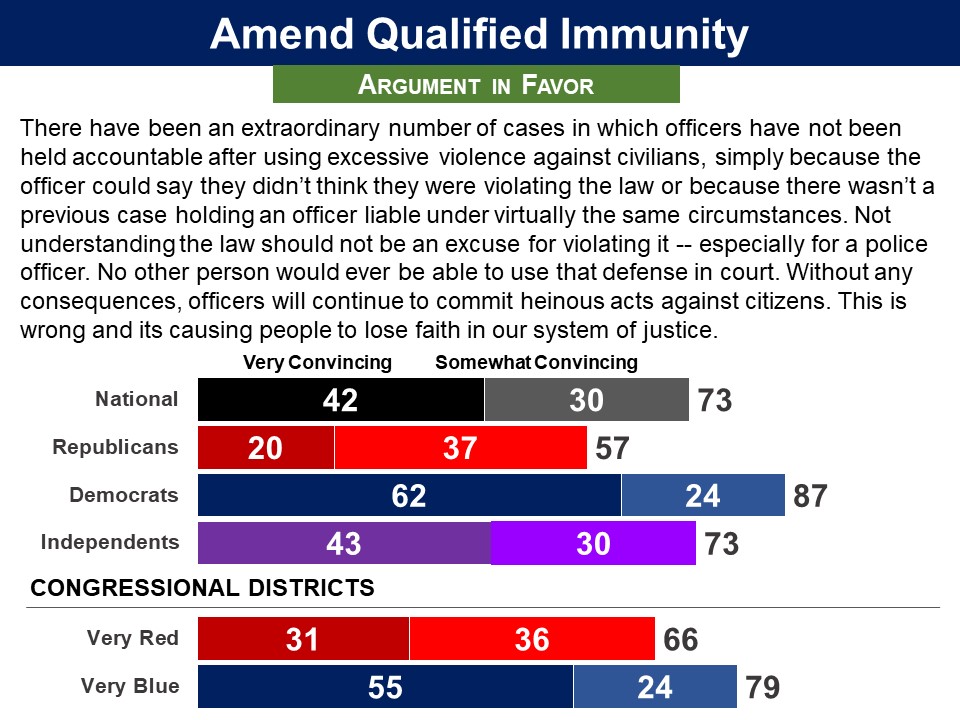 The con argument did not do as well, with half finding it convincing, including a large majority of Republicans (74%), but just three in ten Democrats.
The con argument did not do as well, with half finding it convincing, including a large majority of Republicans (74%), but just three in ten Democrats.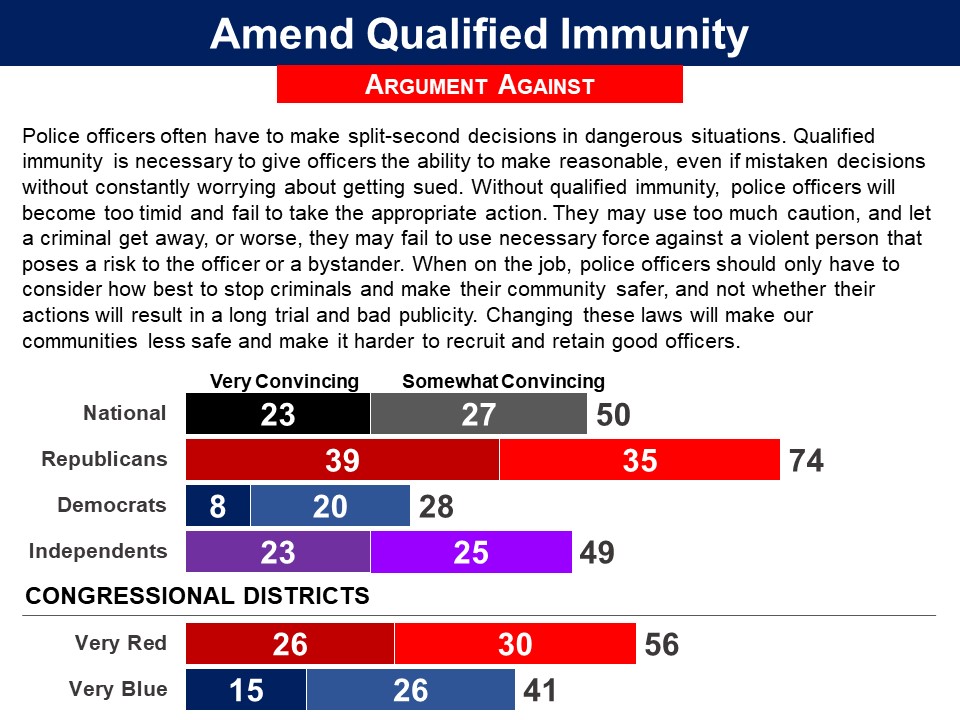 Finally, when asked for their recommendation, 63% favored the proposal, including over eight in ten Democrats and 64% of Independents. Just four in ten Republicans favored it (58% opposed).
Finally, when asked for their recommendation, 63% favored the proposal, including over eight in ten Democrats and 64% of Independents. Just four in ten Republicans favored it (58% opposed).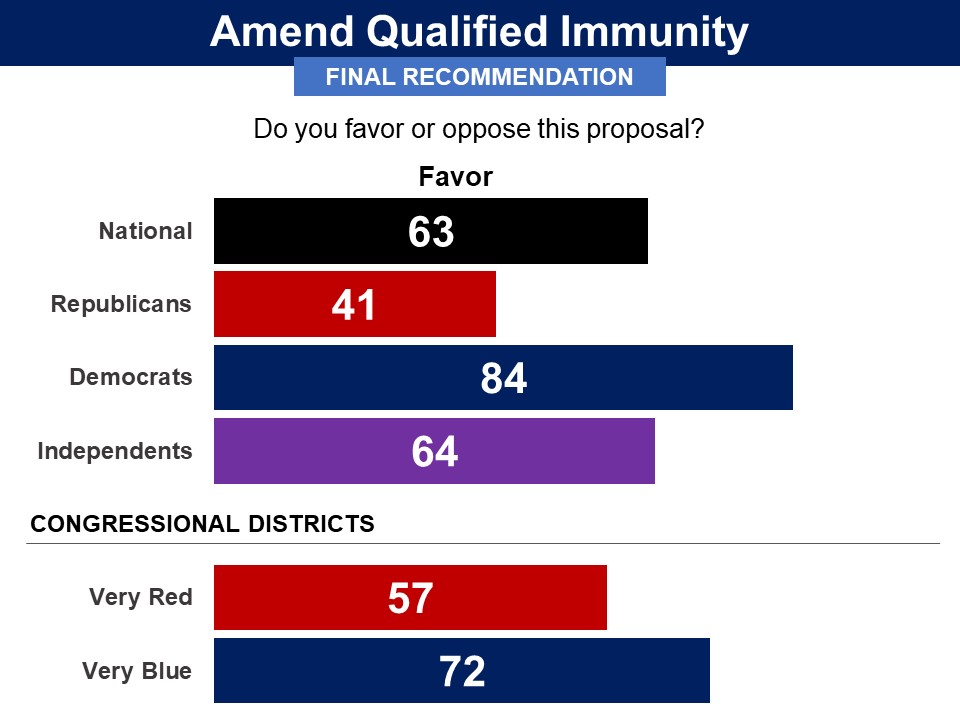
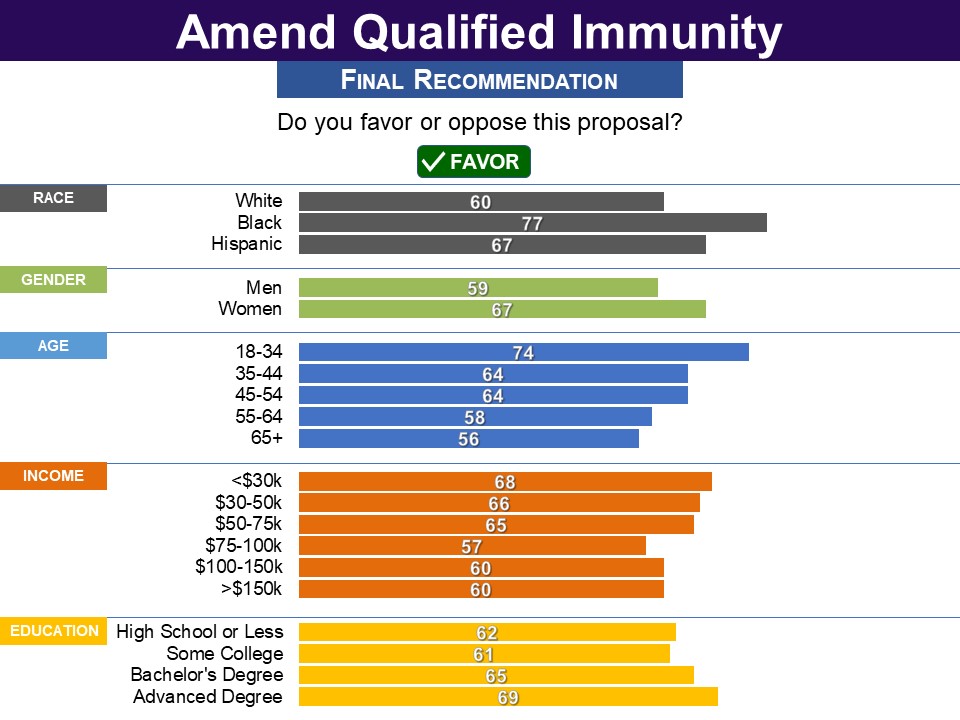 However, on the 0-10 scale, 73% found the proposal at least tolerable (5-10), as did 56% of Republicans and 88% of Democrats.
However, on the 0-10 scale, 73% found the proposal at least tolerable (5-10), as did 56% of Republicans and 88% of Democrats.



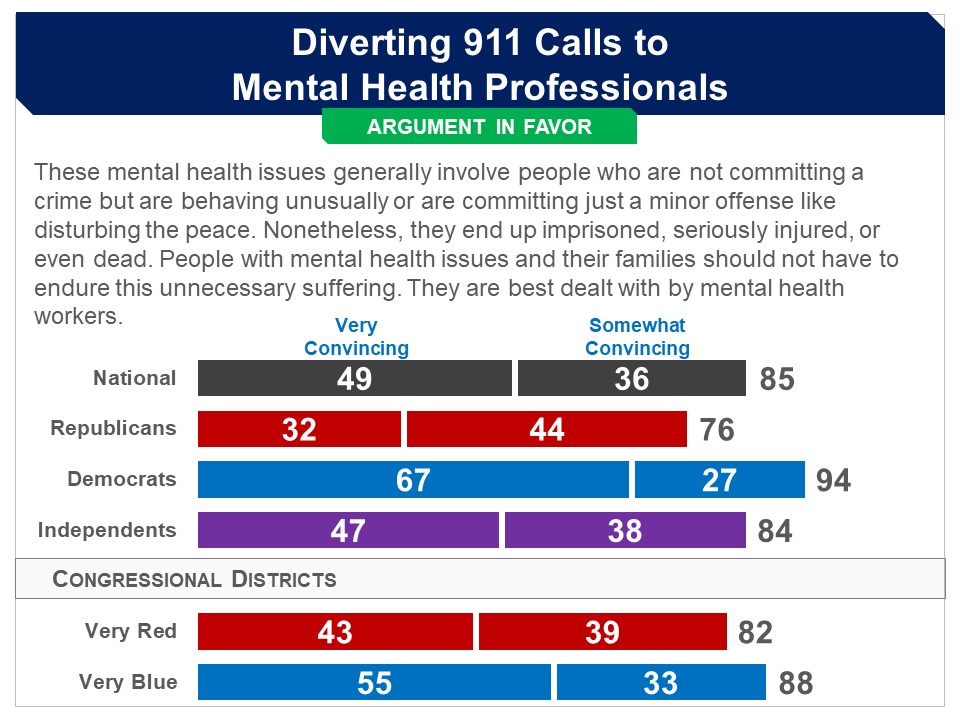
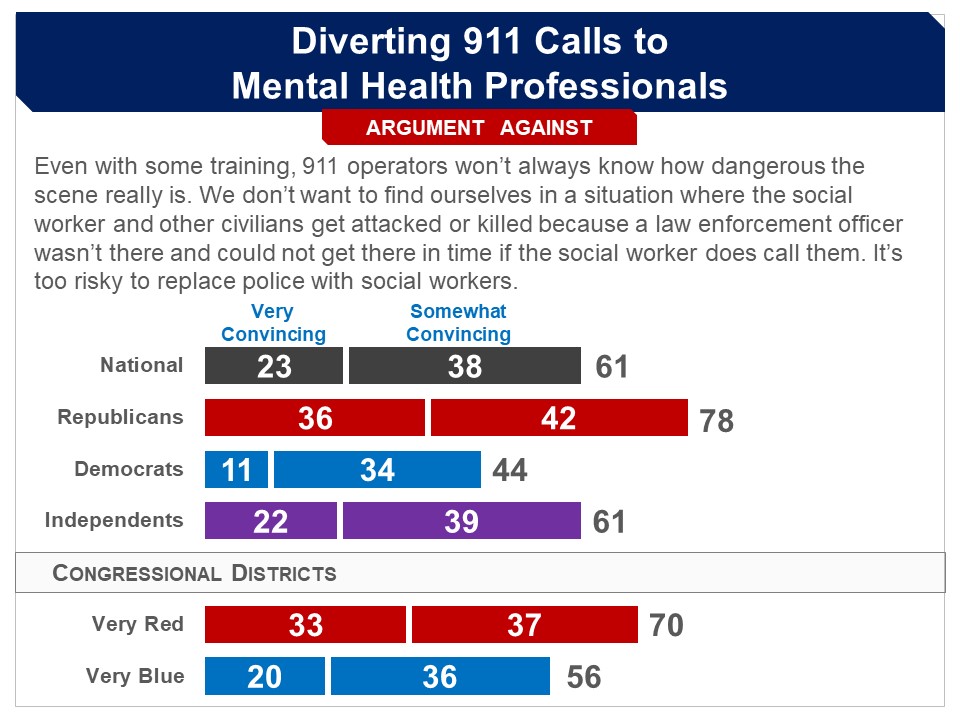
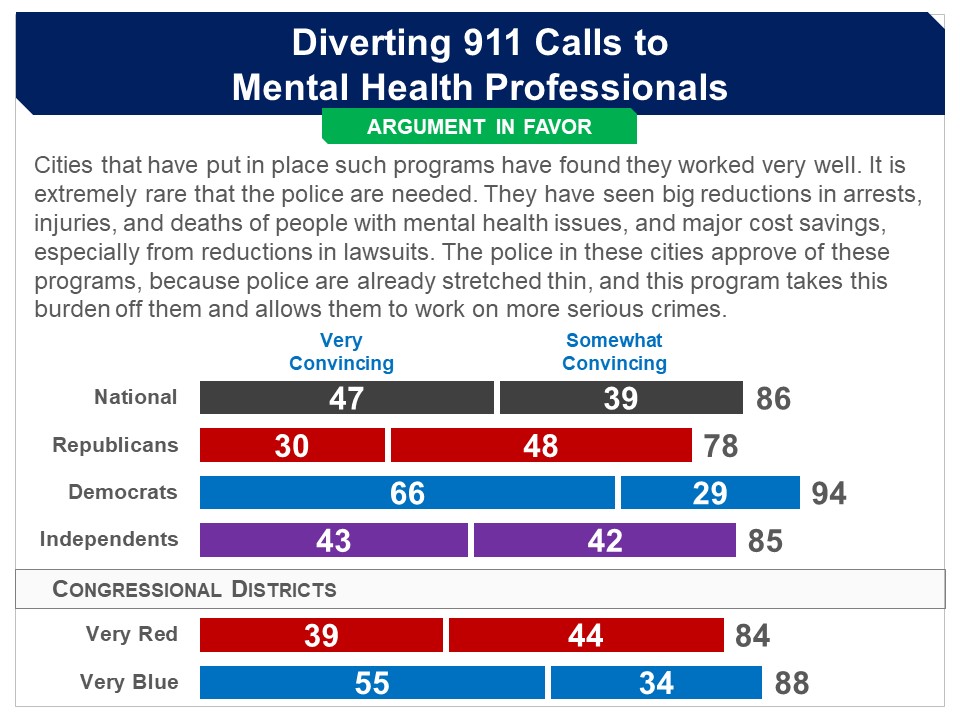
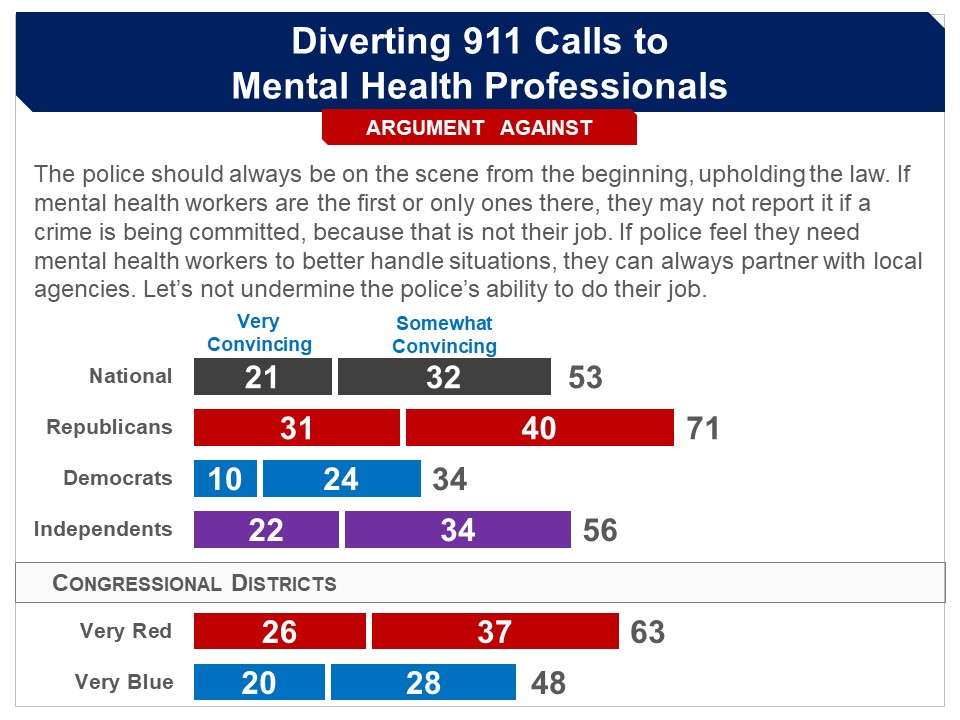
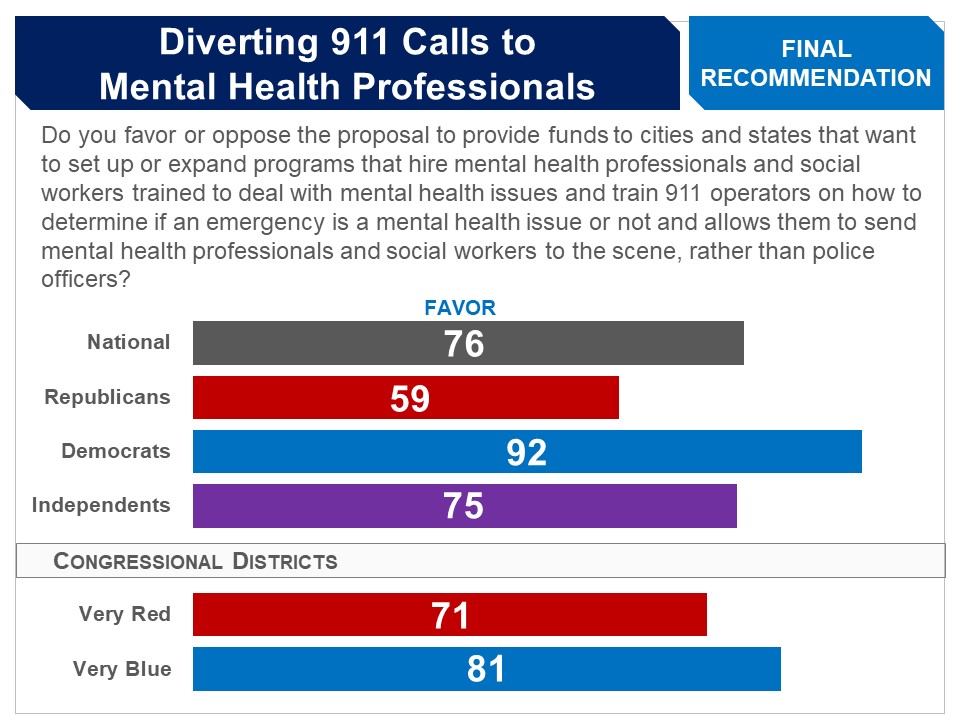
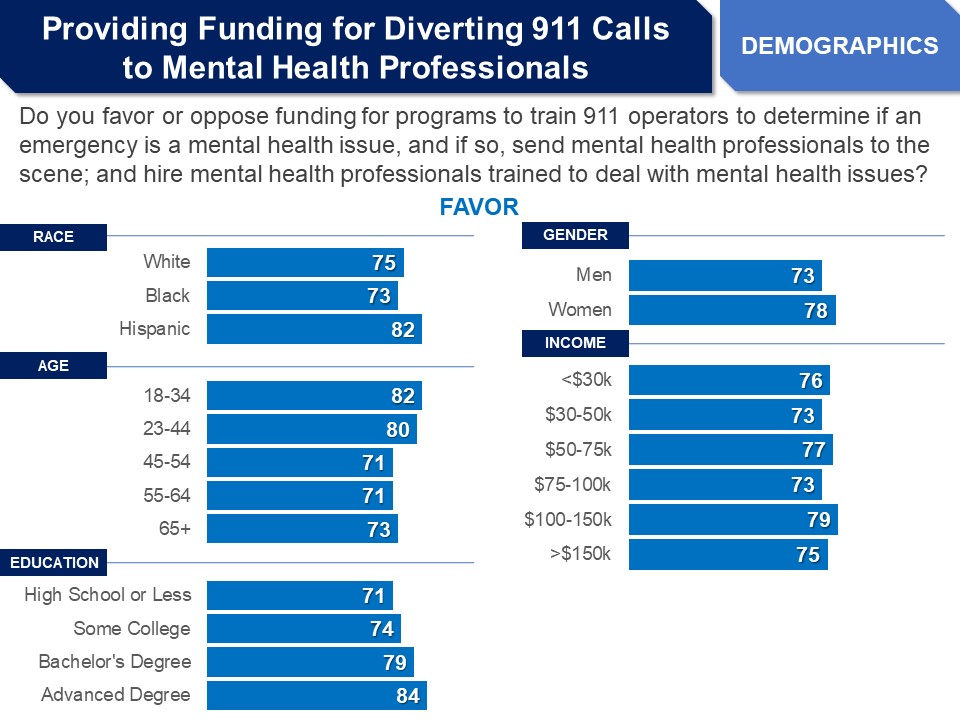


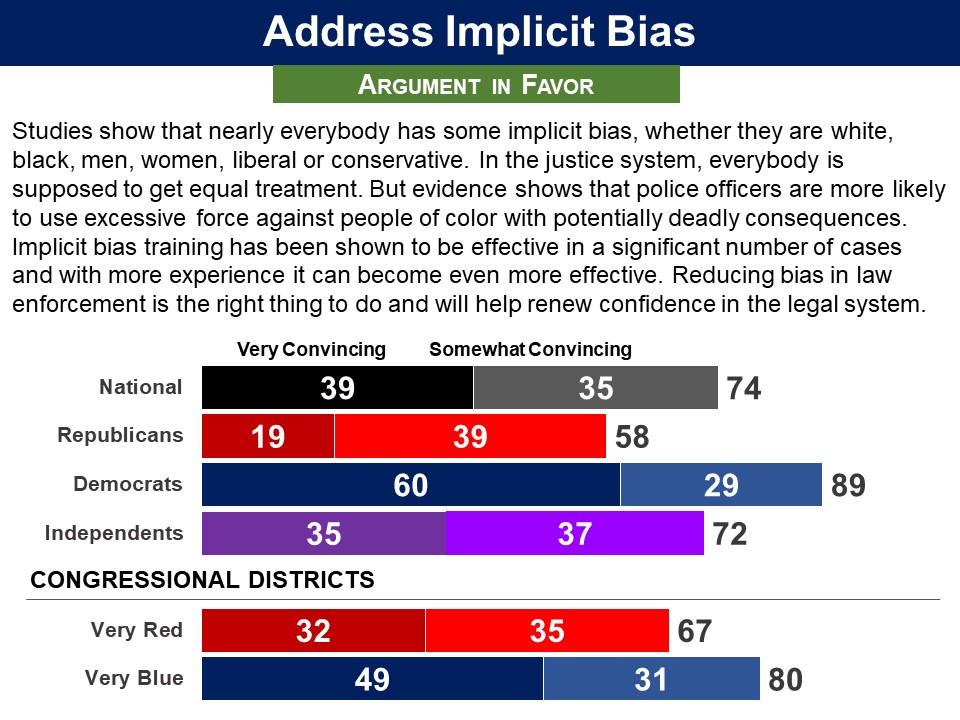 The con argument was found convincing by under four in ten, including just one in five Democrats. A majority of Republicans found it convincing (59%).
The con argument was found convincing by under four in ten, including just one in five Democrats. A majority of Republicans found it convincing (59%).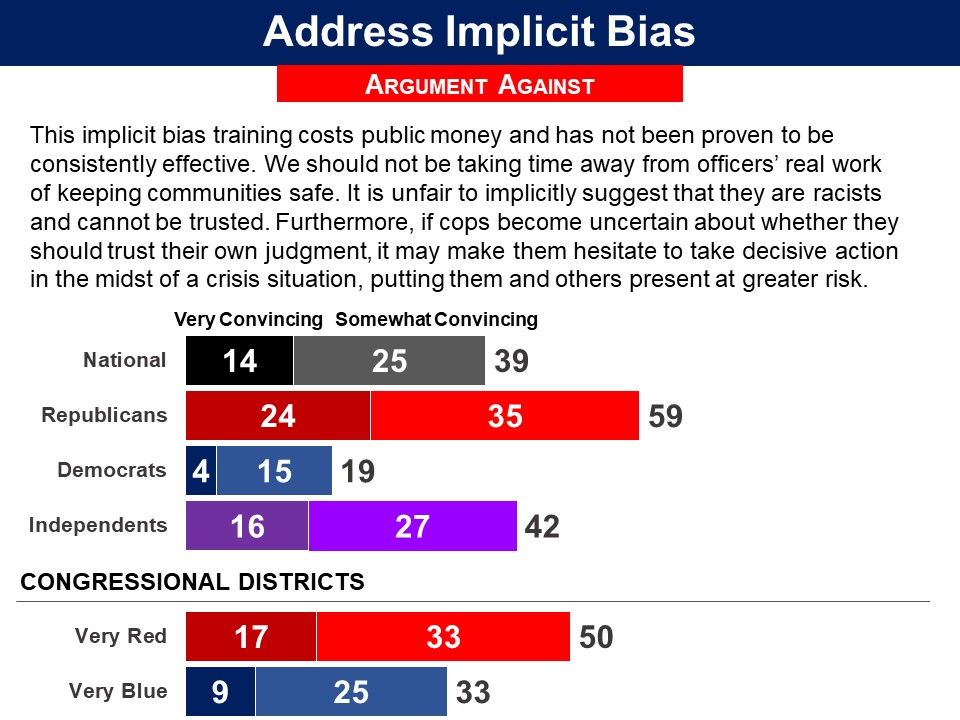 Asked for their final recommendation, a bipartisan majority of 72% favored it, including 89% of Democrats, 68% of Independents and a more modest 53% of Republicans.
Asked for their final recommendation, a bipartisan majority of 72% favored it, including 89% of Democrats, 68% of Independents and a more modest 53% of Republicans.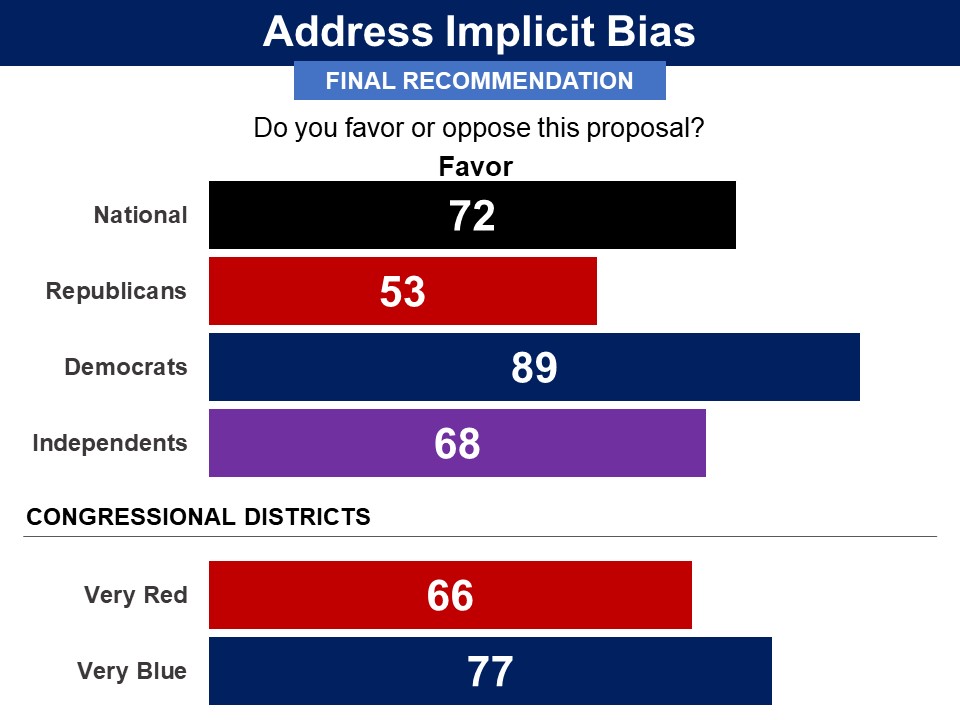
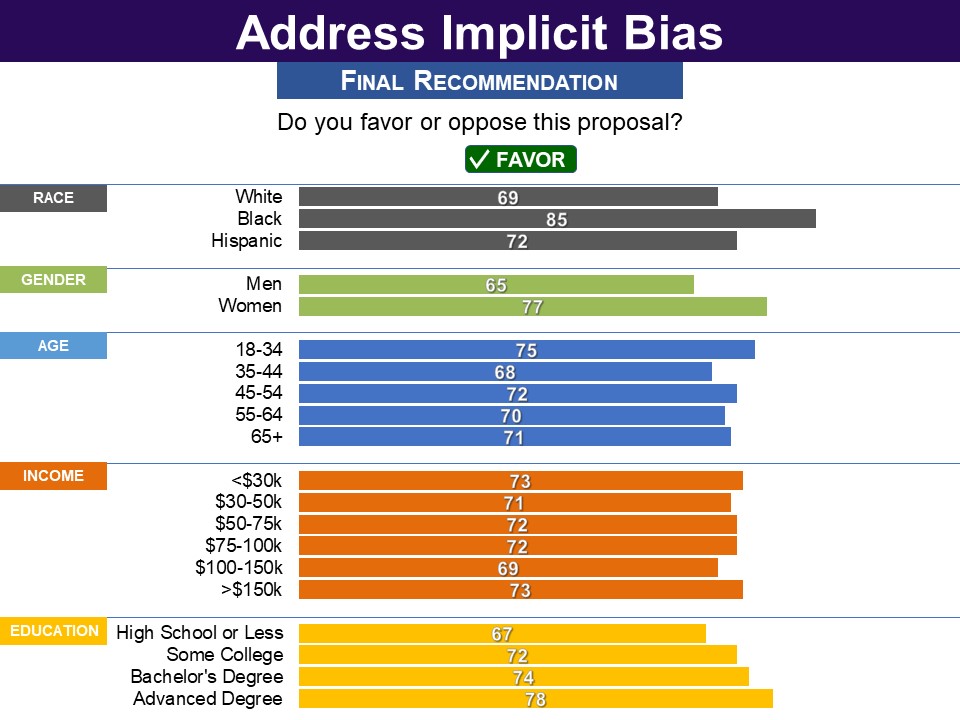 On the 0-10 scale the proposal was rated as at least tolerable (5-10) by eight in ten, including 94% of Democrats and 68% of Republicans.
On the 0-10 scale the proposal was rated as at least tolerable (5-10) by eight in ten, including 94% of Democrats and 68% of Republicans.

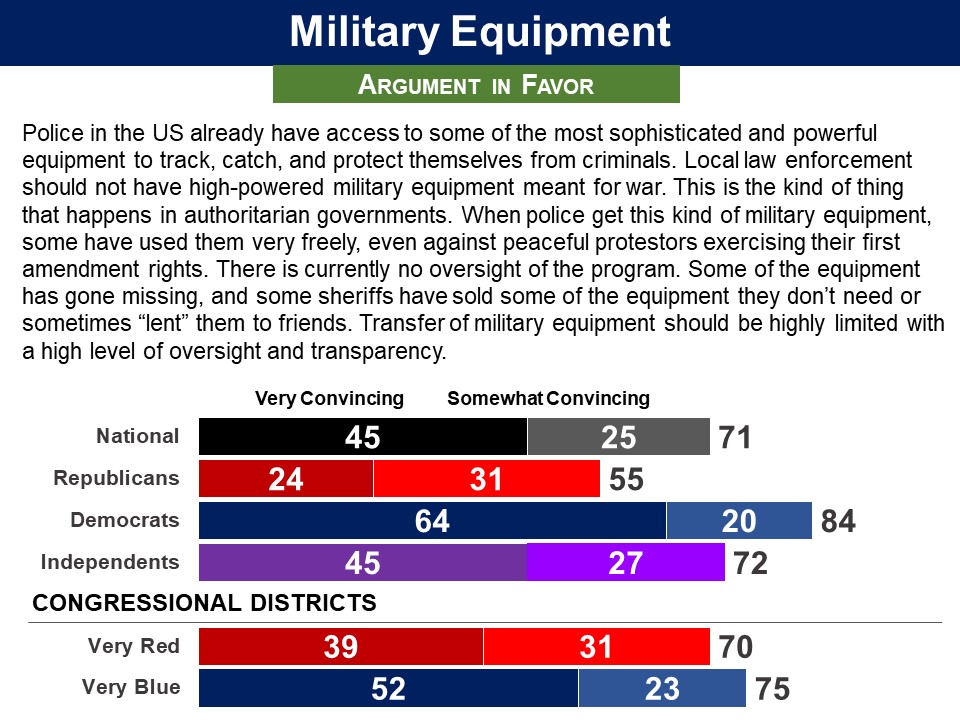 The con argument was found convincing by a bare majority of 52%, including three quarters of Republicans. Just three in ten Democrats agreed.
The con argument was found convincing by a bare majority of 52%, including three quarters of Republicans. Just three in ten Democrats agreed.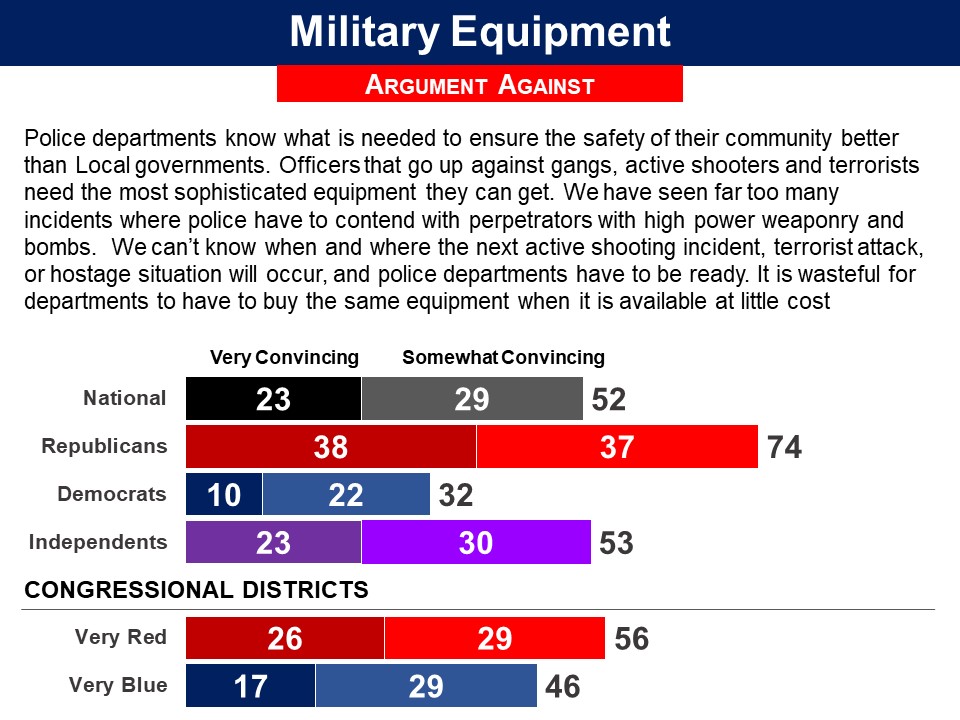 In the end, the proposal was favored by 64%, including 84% of Democrats and 64% of Independents. However less than half of Republicans–43%–concurred (56% opposed).
In the end, the proposal was favored by 64%, including 84% of Democrats and 64% of Independents. However less than half of Republicans–43%–concurred (56% opposed).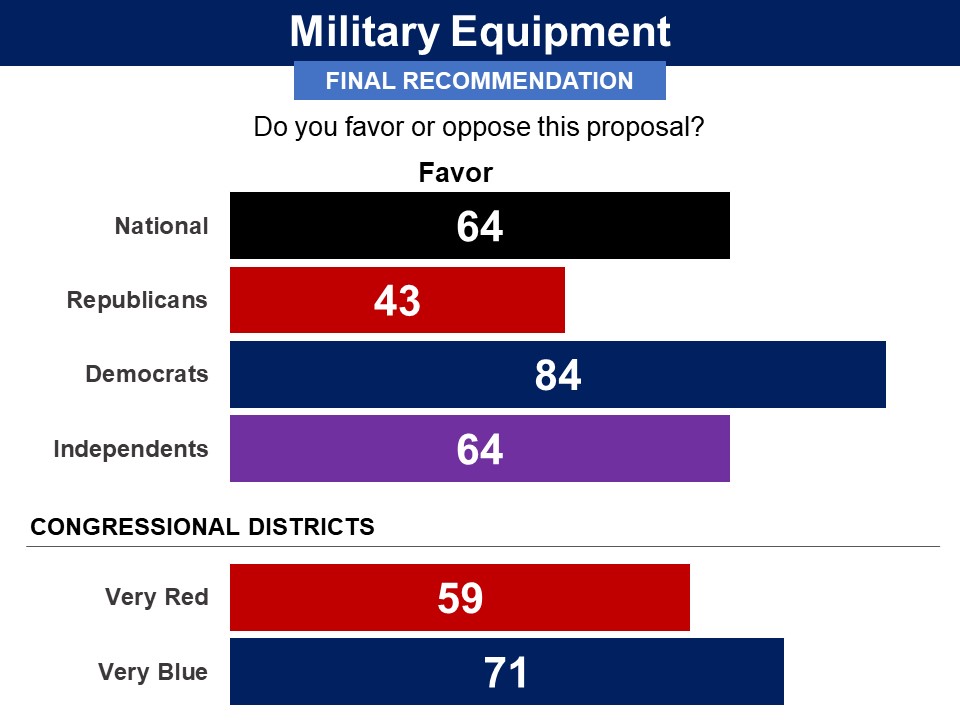
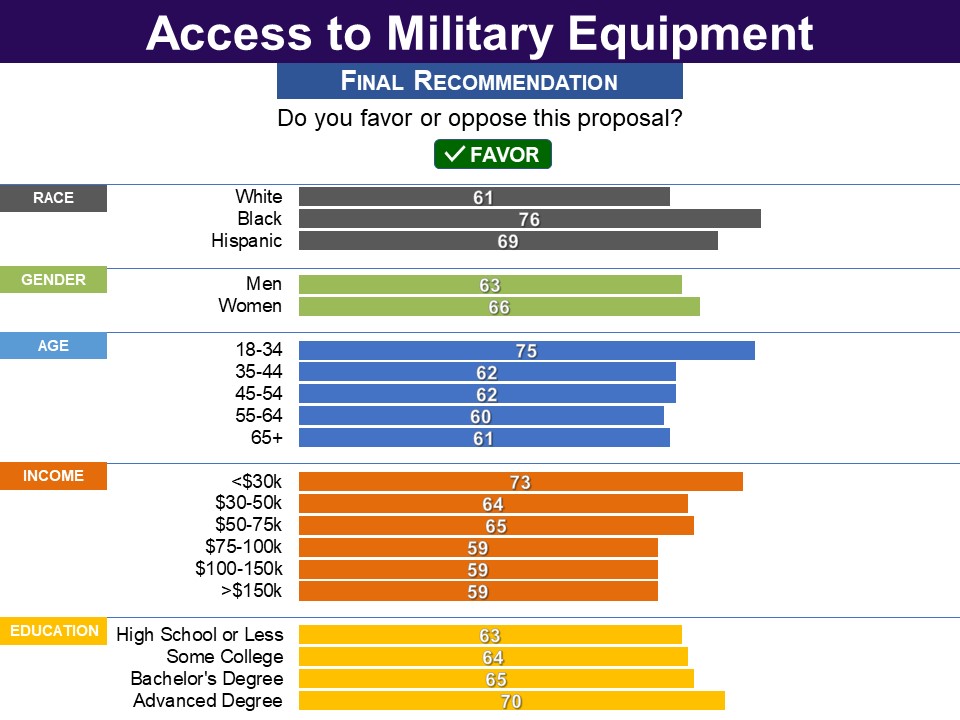 But, on the 0-10 scale, 72% found the idea at least tolerable (5-10), as did 54% of Republicans and 88% of Democrats. Correspondingly, Republicans showed ambivalence in that majorities found both the pro and con arguments convincing.
But, on the 0-10 scale, 72% found the idea at least tolerable (5-10), as did 54% of Republicans and 88% of Democrats. Correspondingly, Republicans showed ambivalence in that majorities found both the pro and con arguments convincing.